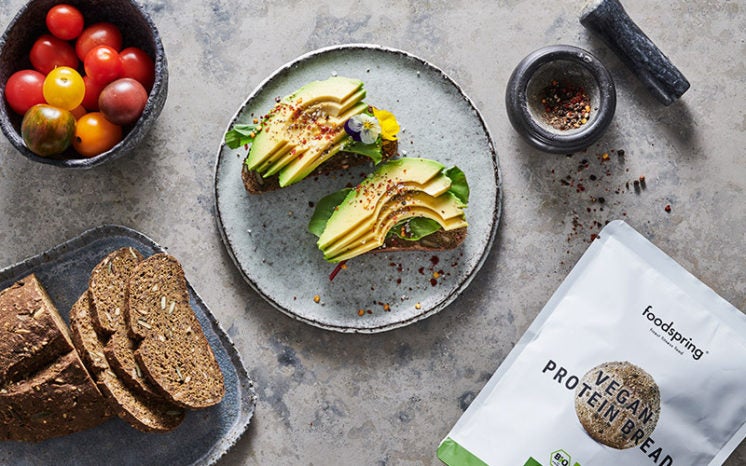What are Macros? Learn more about the nutrients your body needs
 ©Enrique Díaz / 7cero
©Enrique Díaz / 7cero
What are macros? What kind of macronutrient balance is right for you? What do you need to consider when building muscle or losing weight? Let’s shed some light on the subject and explain why not all macros are the same.
What are macros?
Macronutrients, by definition, are the nutrients that give you energy: carbohydrates, proteins, and fats. They’re the basic building blocks of any food. You take them in automatically with food. Each macronutrient – in the fitness and nutrition scene often abbreviated as “macros” – fulfills various functions in the organism and provides you with important micronutrients.
How many macros you need to consume per kilogram of body weight is highly individual. Calculate macros for you and your goals, plus how many calories you need, with our free Body Check:Take our Body Check now
Macros and micros: What’s the difference?
Unlike macros, micronutrients – “micros” – don’t provide you with energy. But that doesn’t mean they’re any less important!
Micronutrients are primarily vitamins and minerals, as well as trace elements. Although you need them in much smaller amounts compared to macronutrients, they’re essential for your health. Each of them performs its own specific function, and those functions range from respiration to supporting skin tissue, down to the smallest cell.
With a balanced macronutrient distribution and a varied diet, you can usually get enough nutrients.
What macronutrients are there?
There are three categories of macronutrients: carbohydrates, proteins, and fats. Each of them has its own important significance for metabolic processes, energy balance, and well-being.
Energy supplier No. 1: Carbohydrates
Carbohydrates are your most important energy sources. They form the basis of your diet and are the most important source of energy for your body. Your brain prefers to consume carbs, as do your muscles.
As soon as you start exercising, carbs are converted into the energy carrier ATP, which allows your body to perform the way you want it to. Short-chain carbohydrates can be processed faster than long-chain, complex carbs.
Your body stores carbs as glycogen in the liver and muscles. Highly trained endurance athletes often have large glycogen stores that allow them to run for long periods of time. Excess carbs that are neither consumed nor stored as glycogen are converted and stored as fat.

The basic building blocks of your muscles: proteins
Proteins are the building materials of the muscles. They are composed of various amino acids. EAAs, or essential amino acids, are especially important for your muscles.
Amino acids are divided into essential and non-essential. While your body can produce the latter, the 9 essential amino acids must be consumed.
Proteins do more than just build muscle. When your carbohydrate stores are empty, amino acids from the muscles serve as a substitute energy source during intensive efforts. But numerous metabolic processes, enzymes, and hormones all need protein to function as we should.
Normally, we get enough protein in our diet. For ambitious athletes or if you’re in a muscle building or weight loss phase, it’s a great idea to try protein-rich foods. Here you can find out more about protein shakes, for example.
Our tip: Discover our protein-rich snacks and bring variety into your healthy lifestyle.Discover protein-rich snacks
Important energy source: fatty acids
Low fat is so yesterday. Healthy fats are actually essential. First and foremost, our bodies greatly benefit from omega-3 fatty acids, which contribute to the normal health of the brain and eye function.

Fats allow you to absorb the important fat-soluble vitamins A, D, E, and K and serve as an energy source for long-term aerobic exercise. Fans of the ketogenic diet favor fatty acids as the most important energy source among the macronutrients.
Fats are divided into monounsaturated, polyunsaturated, and saturated fatty acids as well as trans fatty acids. These all refer to the chemical structure of the individual fats. Unsaturated fatty acids are the healthiest and should be on your plate every day. They’re mainly found in plant-based foods.
Saturated and trans fatty acids are suspected of having a harmful effect on the body and should be less than 10% of your daily food intake. Saturated fatty acids and trans fats can be found in high-fat meat, sausage, baked goods, and fried foods.
Macronutrients Calories: Caloric values at a glance
Macronutrients are used for energy production. The sum of all calories of the macronutrients of a food is what gives its energy content. Each macronutrient has a specific caloric amount, which is independent of the quality of the food.
Caloric value of macronutrients per gram:
- 1g carbs = 4 kcal
- 1g protein = 4 kcal
- 1g fat = 9 kcal
Side Fact: Alcohol has 7 calories per gram. And when you think of all the other ingredients of classic alcoholic drinks – mostly simple carbohydrates in the form of sugar – you’ll quickly realize that cocktails are usually calorie bombs. If you want to maintain those kilos or are on a weight loss journey, it’s better to go for a non-alcoholic version of your favorite drink.

Try our non-alcoholic cocktail recipe
Tracking your macros – what makes sense?
How your macronutrient distribution looks best depends on your goal and your calorie consumption. Even in lower calorie diets, you should pay attention to a sufficient daily intake of complex carbohydrates, proteins, and fats per kilogram of your weight. This is both essential for your metabolism and for ensuring the right supply of micronutrients.
If you want to maintain your weight, the following macronutrient distribution is a good guideline:
- 50% carbs
- 20% protein
- 30% fat
Especially in muscle mass building phases, these values will shift somewhat. If that’s what you’re after, you should plan about 1.2-2.0 grams of protein per kilogram of weight. And you’ll reduce the number of grams of carbs and fats.
But, since fats are essential for your health, always get at least 10-15% of your daily calorie intake from fats. Completely avoiding fats or buying low-fat products makes no sense.
Macronutrient calculator: Track macros
You can play it safe by calculating your macronutrient requirements individually. Your goals, as well as your physical conditions and your actual calorie consumption, play a role.
The easiest way to calculate your daily macronutrient needs and to start tracking macros is with our free Body Check.
Macronutrients: Quality over quantity
The caloric value of protein, carbohydrates, and fats always remains the same, regardless of whether you choose the healthy or the unhealthy version of any given macronutrient.

Still, different foods also have different effects on the body. For example, short-chain carbohydrates are converted into energy more quickly and are the perfect source of energy before intense exertion. But in everyday life, they spike your insulin levels up and down and you have one craving attack after the next. They also usually lack valuable nutrients.
Summary
- Macronutrients give you energy.
- The quality of macronutrients depends on the food.
- Carbohydrates, protein, and fat are macronutrients.
- Your optimal macronutrient distribution depends on your goal, your consumption, and your physical and health conditions.
- You need enough macros to get enough nutrients for your overall health.
- Not all protein, carbs, and fats are created equal. Always choose the healthy version of each macro.
Sources for this article
We at foodspring use only high-quality sources, including peer-reviewed studies, to support the facts within our articles. Read our editorial policy to learn more about how we fact-check and keep our content accurate, reliable, and trustworthy.

























